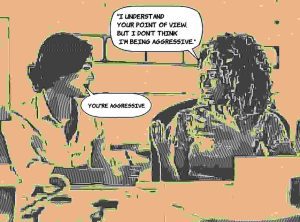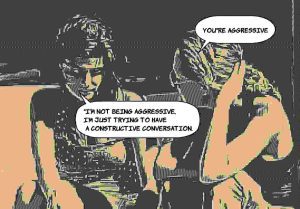It is not uncommon for people to be labeled as aggressive when they are merely speaking their minds or standing up for themselves. Unfortunately, this can lead to feelings of embarrassment, shame, and even anger.
But how should one respond when they are labeled as aggressive? It is important to understand that there are different types of aggression.
While some may be seen as acceptable in certain contexts, other forms of aggression may be seen as unacceptable and even dangerous.
When someone calls you ‘aggressive’, it is important to understand what type of aggression they are referring to and to respond accordingly.
In this article, I’ll be showing you 21 of the best ways to respond when someone calls you aggressive. Goodbye to feeling speechless when someone labels you something you are not.
‘I understand why you might feel that way, but I was just trying to express my opinion.’, ‘I’m sorry, I didn’t realize I was being so intimidating.’, and ‘I’m sorry if I came across as aggressive.
I was just trying to be assertive.’ are the 3 best responses when someone calls you aggressive.
By saying ‘I understand why you might feel that way, but I was just trying to express my opinion,’ you are showing that you understand their feelings and that you were simply trying to state your opinion without being pushy or aggressive.
By adding, ‘I’m sorry, I didn’t realize I was being so intimidating,’ you are acknowledging that your actions may have been intimidating, even if that was not your intention.
Lastly, by saying ‘I’m sorry if I came across as aggressive. I was just trying to be assertive,’ you are showing that you understand the difference between being assertive and being aggressive, and that you were simply trying to express your opinion in a respectful and assertive manner.
All of these responses demonstrate your understanding of the situation and your desire to address the issue in a civil and empathetic manner.
21 Ways To Reply When Someone Calls You Aggressive
When someone calls you aggressive, it can be an uncomfortable experience. Not only can it be hurtful, but it can also bring up feelings of defensiveness and even anger.
The best way to respond to this type of accusation is to remain calm and composed. Here are 21 of the best responses to use when someone calls you aggressive.
1. ‘I understand your point of view, but I don’t think I’m being aggressive.’

This response acknowledges the person’s opinion while maintaining your own point of view. It can help to diffuse the situation and make it clear that you don’t agree with the label.
2. ‘I may have sounded aggressive, but I was just trying to make a point.’
This response acknowledges that you may have come across as aggressive and explains that you were simply trying to make a point. It can help to show that you weren’t trying to be hostile.
3. ‘I apologize if I came across as aggressive. I didn’t mean to.’
Apologizing for any perceived aggression can help to show that you understand their feelings and don’t want to hurt them. It can also be a good way to show that you’re open to talking about the issue.
4. ‘I don’t feel that I’m being aggressive. Can you explain why you feel that way?’
Asking for clarification can be a great way to show that you’re open to discussion and really want to understand the other person’s viewpoint.
5. ‘I understand why you might think that, but I’m not trying to be aggressive.’
Acknowledging the other person’s point of view while maintaining your own can be a great way to show that you understand their feelings while still standing up for yourself.
6. ‘I understand why you might feel that way, but I’m just trying to get my point across.’
When someone accuses you of being aggressive, it can be a tough pill to swallow. You might feel like your intentions are being misconstrued or that you’re not being given a fair shot to express yourself.
However, instead of getting defensive, it’s important to take a step back and listen to the other person’s perspective. By acknowledging their feelings and expressing your own, you can turn a potentially heated situation into a productive dialogue.
Saying ‘I understand why you might feel that way, but I’m just trying to get my point across’ can help to diffuse the tension and clarify your position.
It shows that you respect the other person’s feelings and are open to hearing their concerns, but that you also want to make sure your voice is heard.
By taking this approach, you can communicate more effectively, find common ground, and come to a resolution that works for both parties.
7. ‘I didn’t mean to come across as aggressive. I’m sorry if I did.‘
When someone calls you aggressive, it can be a difficult moment. You may feel like your behavior has been misinterpreted or that you’re being unfairly labeled. In these situations, it’s important to remain calm and take responsibility for your actions.
Saying ‘I didn’t mean to come across as aggressive. I’m sorry if I did’ is a powerful and effective way to diffuse the situation and show that you’re willing to take ownership of your behavior.
This response demonstrates that you’re aware of the impact your words and actions have on others, and that you’re committed to improving your behavior.
It sets the tone for a more productive and positive interaction in the future. By taking responsibility for your actions and expressing regret, you can build bridges and find common ground with the other person, ultimately leading to more effective and fulfilling communication.
8. ‘I’m sorry you feel that way. Can we talk about it and come to an understanding?’
This is a powerful response when someone calls you aggressive because it exhibits a non-defensive, empathetic, and solution-focused approach to resolving conflicts.
This response acknowledges the other person’s feelings and takes responsibility for any role you may have played in their perception of your behavior.
By suggesting a conversation to understand each other’s perspectives, it opens up an opportunity for growth, mutual respect, and resolving the issue in a calm and productive manner. It also diffuses any tension and avoids escalating the situation into a full-blown argument.
Furthermore, it shows that you are willing to listen, take feedback constructively, and work towards finding a solution that works for both parties.
This response displays maturity, emotional intelligence, and a desire to maintain a positive relationship, which can go a long way in resolving conflicts and building trust in relationships.
9. ‘I understand how you feel, but I was just trying to make a point.’
This response acknowledges the other person’s feelings while still making it clear that you weren’t trying to be aggressive.
10. ‘I understand that it may have sounded aggressive, but I was trying to be firm.’
This is a response that can effectively diffuse a potentially tense situation when someone calls you aggressive. This statement acknowledges the other person’s perception of your behavior and shows that you are willing to take responsibility for how you came across.
By clarifying that you were trying to be firm, you are also setting a positive tone for future interactions, as you are indicating that you have a clear intention and that you are open to finding a solution together.
Making it clear that you were trying to be firm and not aggressive can help to diffuse the situation and show that you weren’t trying to be hostile.
11. ‘I understand why you might feel that way, but I was just trying to express my opinion.’
Making it clear that you were simply expressing your opinion can help to show that you weren’t trying to be aggressive.
12. ‘I’m sorry if I came across as aggressive. I was just trying to be assertive.’
This response acknowledges the other person’s feelings while making it clear that you were trying to be assertive and not aggressive.
13. ‘I’m not being aggressive, I’m just trying to have a constructive conversation.’

This response is a great way to show that you are not trying to be aggressive, but rather that you are trying to have a productive and respectful conversation.
14. ‘I’m not being aggressive, I’m just standing up for what I think is right.’
This response is a great way to show that you are not trying to be aggressive, but rather that you are standing up for what you believe is right.
15. ‘I’m not being aggressive, I’m just trying to defend my point of view.’
This response is a great way to show that you are not trying to be aggressive, but rather that you are trying to make sure that your point is understood and respected.
16. ‘I’m not being aggressive, I’m just trying to defend my point of view.’
This response is a great way to show that you are not trying to be aggressive, but rather that you are trying to make sure that your point is understood and respected.
17. ‘Aggressive is not a word I’d use to describe me.’
This response is a great way to show that you are not comfortable with being labeled as aggressive, and that you are not willing to accept that label.
18. ‘I’m passionate, not aggressive.’
This response is a great way to show that you are passionate about the topic or situation at hand, but that you are not trying to be aggressive about it.
19. ‘I’m sorry, I didn’t realize I was being so intimidating.’
This response is a humorous way to acknowledge that you may have been a bit too passionate.
It’s a great way to show that you understand how the other person may have felt and that you don’t want to make them feel uncomfortable or threatened. You can follow up with a joke or make light of the situation in order to break the tension.
20. ‘Are you sure you’re not just intimidated by my brilliance?’
This response is a great way to get a laugh out of the situation and also show that you are not taking the accusation too seriously. It’s also a great way to show the other person that you are confident in your opinions and that you don’t feel the need to back down.
21. ‘I guess I just have a lot of feelings and I’m not afraid to express them.’
This is a great way to show that you are not trying to be aggressive, but rather just passionate about something. It’s also a great way to show that you aren’t afraid to express your feelings and that you aren’t afraid to stand up for yourself and your beliefs.
When someone calls you aggressive, it can be difficult to know how to respond. However, with these 21 responses, you can reply in a way that shows that you are passionate and assertive, without resorting to aggression.
Conclusion
In conclusion, responding to someone who has called you aggressive can be a difficult situation to navigate.
It’s important to take a moment to assess the situation and try to understand why the other person might have called you aggressive. Once you have done this, it is best to take a deep breath and remain calm.
The goal is to avoid escalating the conflict and to reach a positive resolution. It is also important to listen carefully to the person who has called you aggressive, as they may have important insights or suggestions to offer.
If possible, try to come to an agreement and find a way to move forward without either of you feeling attacked.
With patience, understanding, and a desire to resolve the situation, it is possible to come to a successful resolution when someone calls you aggressive.
I hope this article has enlightened you and helps in your daily relations with people.